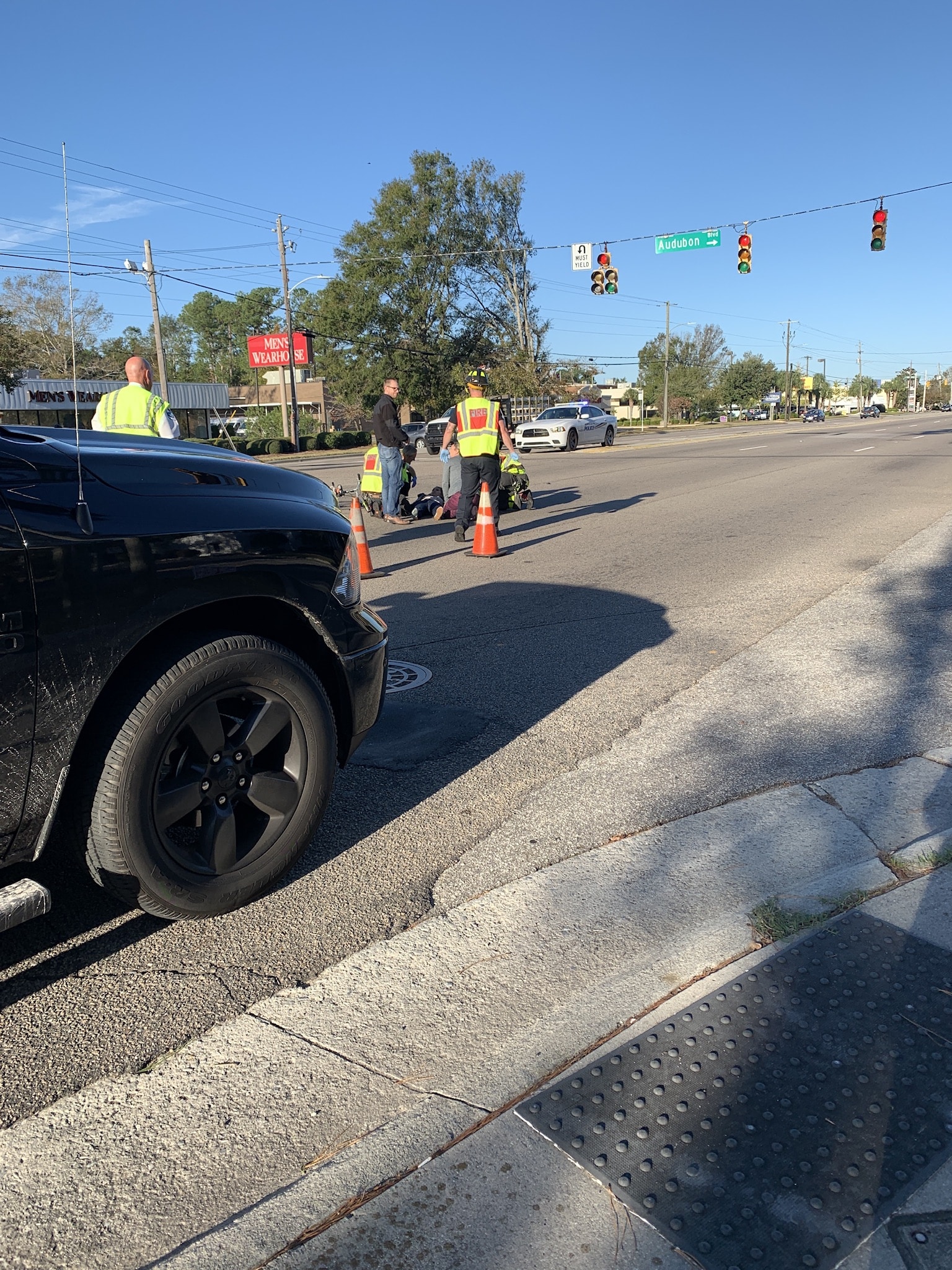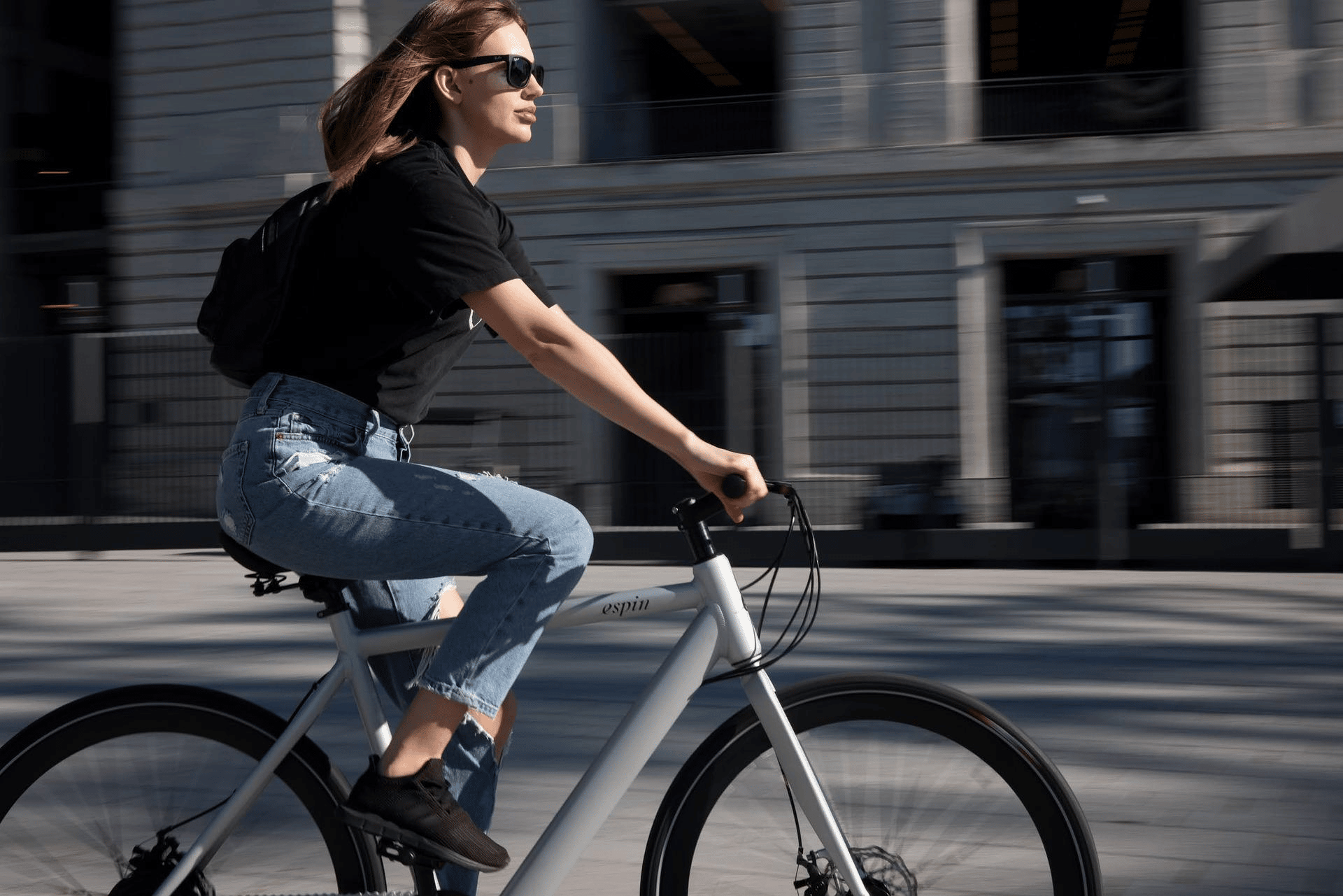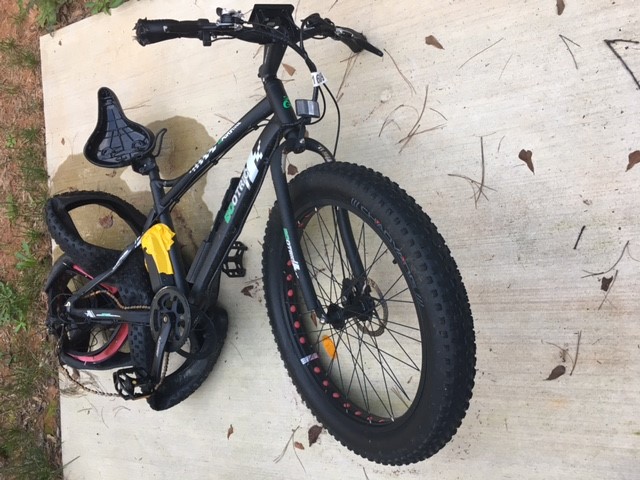An Interview with Bob O’Brien at Noyes, Hall and Allen Insurance
Prologue
Last month, I rode across the Casco Bay Bridge to talk e-bikes and insurance with Bob O’Brien, the Vice President of Noyes, Hall and Allen Insurance in South Portland, Maine. Although I have yet to invest in an e-bike for myself, I have been captivated by e-bikes and their potential to get and keep more people on bikes ever since I saw friends use an e-bike to maintain their bicycle commuting routines over some of San Francisco’s steepest and most dizzying hills during their son’s pre-school years.
In Maine, we recently passed new e-bike legislation, and it won’t be long before more people in my home state are using e-bikes. I already have a neighbor who commutes over forty miles a day on her e-bike, a friend with orthopedic challenges who recently purchased an e-bike so that she could continue to ride with her zippy husband, and a professional colleague who keeps his suits smelling cleaner than mine by using his pedal-assist e-bike to climb hills and get around the city on hot and muggy summer days.
Further, bike shops across Maine are now carrying and renting a wide selection of e-bikes alongside fleets of more traditional gravel, road and mountain bikes and are introducing them to the public at places like the State House, Eastern Trail and the Camden Snow Bowl. Event organizers have also noted that people are asking to use their e-bikes at events like BikeMaine, the Trek Across Maine and the Dempsey Challenge. In addition, members of Maine’s aging population are becoming increasingly intrigued by the opportunities that e-bikes present when it comes to allowing them to keep pace with their children and grandchildren.
With this new electricity in the air, it is important for people to understand the insurance issues that accompany this newer form of transportation, as well as what they can be doing to best protect themselves and others in the event of a crash, collision or other incident. This is how I came to meet up with Bob O’Brien for the e-bikes and insurance interview below. Not only is Bob a guru on all things insurance, but he is an avid bicycle commuter. I knew that he would find this topic as interesting as I do and would do his best to help answer questions like the following:
- Are e-bike owners required to carry insurance?
- If I am riding an e-bike on a public roadway and am hit by an uninsured or underinsured motor vehicle operator, will my own insurance cover my damages?
- If I am jogging on a multi-user trail and am hit by an inattentive or dangerous e-bike rider will that e-bike rider’s motor vehicle insurance cover my damage?
- Does my homeowners insurance cover my e-bike if it is stolen or damaged?
- Are there any companies that carry insurance that specifically covers e-bikes?
- If I rent an e-bike from a bike share program like Jump, Lyft or Lime do I need to worry about insurance coverage?
- If I am hit by an inexperienced Jump, Lyft or Lime user, will there be insurance coverage?
What follows is my interview with Bob. First, a few notes, warnings and disclaimers:
This is not a piece about Maine’s new e-bike laws. If you want to read a summary of the news legislation, check out my article on that here.
Although there is some discussion of the law in the interview, no portion of the interview should be construed as insurance or legal advice. If you have specific questions about an e-bike insurance issue or e-bike legal case, understand that you should seek competent advice from either an insurance agent or an attorney, depending on the question and circumstances. Answers to questions about coverage are often very fact specific and highly circumstantial.
Readers are forewarned they may find some of the ambiguities in Bob’s responses or this area of law to be frustrating. As Bob pointed out when we met, the insurance world has yet to catch up with the electric bike and scooter movement. Peoples’ questions about who covers what, if at all, in e-bike cases are much like the questions that were asked about Airbnb, Uber and Lyft during the nascent stages of the home away from home and ride sharing movements. Insurers have yet to tackle some of these issues in policies and often there is no explicit guidance in policy language.
It is hoped that those who read this piece will be alerted to insurance issues surrounding e-bikes in advance of them arising in their own lives. For those who are e-bike owners or who plan to ride in places where e-bikes are present, the questions I ask of Bob are questions that you may want to be asking your own insurance agents and companies. Likewise, for those renting e-bikes or organizing events where e-bikes are present, the liability questions discussed below are ones that should be considered together with your insurance companies and legal counsel.
The Interview
Lauri: Let’s start out with some background information on you. I know you are an avid bicycle commuter and have been in the insurance industry for quite some time. Tell me some more about why you ride and why you work in this field.
Bob: I consider myself a transportational cyclist. I try to bike, walk or take public transportation first, and drive only when there’s an overriding advantage to do so. I’ve been a bike commuter since 2008, year-round since 2010. I love the way it combines health and ecological benefits, and how it encourages me to shop local. I’ve been an insurance agent for 25 years. I really enjoy being part of the local community and helping people and businesses to protect their loved ones and things that bring them joy.
Lauri: How about your experience with e-bikes? Have you ever ridden one? Do you have any interest in acquiring one?
Bob: I rode my first e-bike last winter in Cambridge, MA. It took a few minutes to get over the feeling that I was moving a lot faster than I should be for the work I was doing. I really liked it. My commute is only 6 miles one way, and I can handle the hills comfortably. If my commute was longer or hillier, I’d strongly consider buying an e-bike. As I get older, I think it could extend my years enjoying a transportational cycling lifestyle.
Lauri: Okay, now on to the topic at hand. Let’s start out with one of the most frequently asked questions: Are e-bike owners required to carry insurance under Maine’s new e-bike laws?
Bob: No, so long if the bike truly is an e-bike, as defined by Maine law. Some bikes with motors do not qualify as e-bikes. They may fall under the definition of motorcycles or mopeds, in which case insurance would be required by the State.
Regardless of whether coverage is required of e-bike owners, it is recommended that all e-bike owners consider the risks and responsibilities associated with owning an e-bike and the insurance protections that they may want in place in the event of a crash, collision or another unfortunate event.
Lauri: If I am riding an e-bike and hit a pedestrian or another bike rider with that e-bike, will my automobile insurance, homeowner insurance, or rental insurance cover the losses caused by me? Likewise, what if I damage property (e.g. dent a car or cause damage to someone else’s bike) with my e-bike? Will there be coverage?
Bob: Most automobile policies exclude liability coverage for the operation of a vehicle with fewer than four wheels. So, most likely your automobile insurance would not offer coverage for the losses caused by you while on your e-bike.
Coverage, if any, might be available under your homeowners or rental insurance policy, if you had such a policy in place. Most homeowners and rental insurance policies offer protection for their insureds for any bodily injuries or property damage caused by an insured while riding a regular bicycle (i.e. a non-motorized bike). However, these same policies generally exclude coverage for damage caused by an insured while operating a “motor vehicle.”
This begs the question: Is an e-bike a motor vehicle? Many homeowners and rental insurance policies define “motor vehicle” as a “self-propelled land or amphibious vehicle.” Under Maine’s new e-bike laws, the answer could very well depend on whether a bike falls under the definition of e-bike and the class of e-bike you are riding at the time of a crash, collision or incident.
Under Maine’s new e-bike laws, a Class 2 e-bike appears to be a “self-propelled vehicle,” so under most standard homeowners and rental policies, there would not be coverage for the damages caused by you. However, if you were pedaling or riding a Class 2 e-bike unassisted at the time of a collision you may want to argue that it was not a “self-propelled” motor vehicle.
With respect to Class 1 & 3 e-bikes, there’s a stronger case to call them NOT self-propelled vehicles. Still, depending on the bike, the insurance policy, and the circumstances surrounding an event, this will be left up for interpretation by insurance adjusters, attorneys, and ultimately the courts.
Lauri: Several years ago, I wrote a piece about the importance of a bicyclist’s own automobile insurance in the event of a crash. In that piece, among other things, I talk about how uninsured/underinsured motorist coverage (i.e. the coverage from a bicyclist’s own insurance) may be available in cases where a negligent driver does not have insurance or does not have enough insurance. If I get hit while riding my e-bike, and the driver who hit me flees the scene, fails to carry insurance, or does not have enough insurance to cover my damages, will my own automobile uninsured motorist coverage or underinsured motorist insurance cover me?
Bob: Most standard automobile insurance policies exclude coverage to insureds for their damages when they are operating motor vehicles that are not explicitly listed as insured motor vehicles under their policies.
Most standard automobile policies do not define the term “motor vehicle,“ and most e-bike riders do not consider their e-bikes to be “motor vehicles” and, therefore, don’t purchase automobile insurance coverage for them or have their e-bikes described and listed on their insurance policies. That said e-bikes do have motors, which could cause some carriers to deny coverage in the circumstances you describe above. On the other hand, if there was a legal dispute regarding policy interpretation, courts would have to decide. Would a court use the definition of “motor vehicle” found in Maine law, which makes it clear that e-bikes are not motor vehicles? If so, the court might find that the uninsured and underinsured coverage afforded to e-bike riders is the same as would be afforded to the riders of traditional bikes. For now, it’s unclear to me how insurers and courts will interpret Maine’s law.
Lauri: As an attorney who regularly represents people involved in motor vehicle operator versus bicycle rider crashes, it has been my experience that most bicyclists will have access to medical payment coverage (“medpay coverage”) under their own automobile insurance, regardless of fault. If I am riding my e-bike and am involved in a crash with a motor vehicle operator, will I have access to my medpay coverage?
Bob: Most standard automobile policies exclude medpay coverage for injuries sustained while occupying a motorized vehicle having fewer than four wheels. As I discussed earlier when we touched on access to uninsured and underinsured coverage, there is uncertainty right now on how strictly the term “motor vehicle” will be interpreted in e-bike crashes and coverage questions.
Lauri: Could a person get around the ambiguities about whether they are entitled to uninsured, underinsured and medical payments coverage under their own insurance policies by paying for additional coverage on their e-bike and getting it listed on an automobile policy?
Bob: Yes, but you might have to find a new insurance company or agent. Only a few insurers offer specific e-bike policies. Our independent agency represents more than a dozen insurers, and only one has an e-bike solution. Call your agent first. If they can’t help you, try another agent or check online. Just be careful: a lot of the e-bike policies have really low uninsured motorist limits.
Lauri: Bike share programs, many of which offer e-bike options, are popping up all over the world. One of the positive aspects of these programs is that more people are riding bikes, which helps to increase public attentiveness to bicycles on the roadways. However, the “user agreements” for these e-bike share programs often contain releases, disclaimers, assumption of risk provisions and binding arbitration clauses, all of which appear to be designed to deny coverage by the bike share company and its parents and affiliates in the event of a crash, collision, or other tragedy. Given these “user agreements,” do you have any thoughts on how people can protect themselves through personal insurance or other means?
Bob: Honestly I don’t. Even the specific e-bike policies I’ve seen only cover the ones you own, not ones you use or rent. Before I used one of those shared e-bikes or scooters, I’d read the agreement and make sure I had some protection from the sharing network. For now, I limit myself to traditional bike shares. You’re covered when you use those just like your regular bikes.
Lauri: How can I make sure that I have property coverage for my e-bike so that I can replace it if I crash it on my own, it gets stolen, or I drive it into my garage because I forget it is on my roof rack? Also, how do I confirm that I am purchasing replacement coverage (i.e. cost of replacing my e-bike) versus purchasing depreciated value coverage (i.e. value of property at the time it is damaged)?
Bob: Most “off the shelf” homeowners and renter insurance policies pay depreciated value, not replacement value. However, you can purchase a replacement cost option for most policies.
It is important to note that most “off the shelf” policies cover your belongings for sixteen “named perils.” Theft is a named peril. Collision is not. You can purchase “open perils” coverage on many policies. This covers damage unless it’s excluded. Collision is not excluded. BUT, most standard homeowners and rental policies exclude coverage for damage to “motor vehicles.” As discussed earlier, most standard homeowners and rental policies also define “motor vehicle” as a self-propelled land or amphibious vehicle. Is your e-bike a motor vehicle? If not, it would most likely be covered under the policy.
Lauri: If I have an umbrella policy, will it apply to any of the scenarios that we have already discussed in this interview?
Umbrella policies provide no property coverage. They usually cover excess liability above your primary homeowners, rental and automobile insurance policies.
Some umbrella policies have the same exclusions and definitions as home and auto policies. Others do not. In addition to providing excess liability coverage, umbrellas with separate insuring agreements may also provide “first dollar” coverage for claims NOT covered by your auto or home policy.
Some insurers offer uninsured/underinsured motorist coverage on the personal umbrella policy. Depending on how that coverage form treats e-bikes, you MAY have UM coverage on your umbrella policy.
Lauri: Are you aware of any insurance companies that specifically offer e-bike coverage?
Bob: There are a few companies out there, but purchasers are cautioned to make sure that they are getting the coverage that they want at a price that is fair.
SAFECO, one of the insurers that my company works with, does have an insurance product for e-bikes that provides up to $500,000 in liability coverage (i.e. coverage that protects you if you hurt someone else with your e-bike), $500,000 in UM/UIM coverage (i.e. the underinsured and underinsured coverage we discussed earlier) and will even write up to $25,000 in medpay coverage (i.e. the medical insurance that will be available to you for reasonable medical expenses incurred, regardless of fault). However, right now, e-bike coverage is expensive in comparison to scooter coverage, which shows that the insurance industry has a way to go before e-bikes are normalized. But, at least there is a product out there right now that I would feel comfortable selling people.
Lauri: Many people these days are giving up their cars and are relying solely on e-bikes, bikes, walking and public transportation to get around. Are there companies that will offer these people the same types of protections available to people who carry automobile insurance (i.e. UM/UIM and medpay coverage) if they are involved in a collision that is not their fault? What companies and products would you recommend?
Bob: SAFECO is the only company I’m familiar with that I’d recommend. Because they offer up to $500,000 UM/UIM and $25,000 medical payments, I’m comfortable placing my clients with SAFECO.
Lauri: Event organizers often debate whether to allow e-bikes at their rides, races and events. Is there a specific type of insurance coverage that these organizers should ensure is in place before allowing e-bike riders at their events?
Bob: Because insurance coverage for e-bikes is rare, organizations shouldn’t expect that riders are properly insured. If the rider has no insurance, the sponsoring organization could be open to liability for injuries or damages caused by the participant. Event organizers should check with their insurance agents to make sure the organization’s assets are protected.
Lauri: What else? Any other words of wisdom on e-bikes and insurance?
Bob: In all cases, it’s best to check with your agent to see what kinds of insurance policies and coverage you have. Explain that you are an e-bike owner and that you’re concerned about insurance coverage. In all cases, your agent should be able to show you the wording in your policy that leads them to think you do or don’t have coverage, and why.
Lauri: Thank you, Bob, and happy riding!
If you are in need of representation in Maine contact one of our Bike Accident Lawyers in your area.
Portland Bike Accident Attorney

Lauri Boxer-Macomber has been an avid rider for decades. Lauri’s Maine law practice is focused on advocating for the rights of bicyclists, pedestrians, and other vulnerable road users.
Lauri’s riding experience and legal training are complemented by her advocacy work. She is an active Board Member of the Bicycle Coalition of Maine, a Governor of the Maine Trial Lawyers Association, and a Member of the American League of Bicyclists. She also chairs the Bicycle Coalition of Maine’s Policy and Legislation Committee and is one of the founding members and facilitators of the Bicycle Coalition of Maine’s Law Enforcement Collaborative, a group of law enforcement officers, planners, bicycle advocates, and others who meet regularly with the goal of improving safety on Maine’s roadways.











